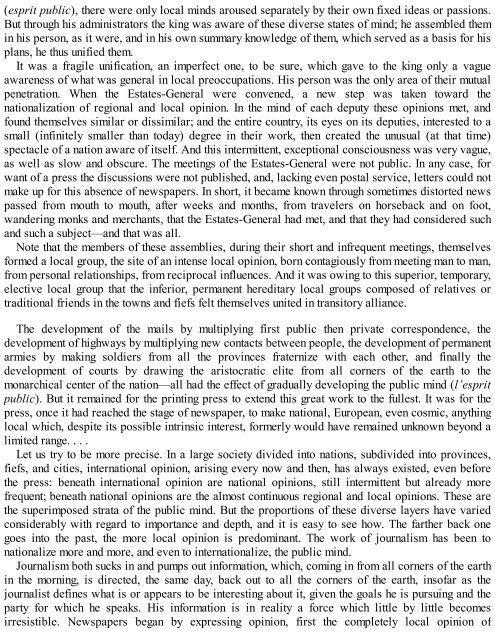3658925934
Create successful ePaper yourself
Turn your PDF publications into a flip-book with our unique Google optimized e-Paper software.
(esprit public), there were only local minds aroused separately by their own fixed ideas or passions.<br />
But through his administrators the king was aware of these diverse states of mind; he assembled them<br />
in his person, as it were, and in his own summary knowledge of them, which served as a basis for his<br />
plans, he thus unified them.<br />
It was a fragile unification, an imperfect one, to be sure, which gave to the king only a vague<br />
awareness of what was general in local preoccupations. His person was the only area of their mutual<br />
penetration. When the Estates-General were convened, a new step was taken toward the<br />
nationalization of regional and local opinion. In the mind of each deputy these opinions met, and<br />
found themselves similar or dissimilar; and the entire country, its eyes on its deputies, interested to a<br />
small (infinitely smaller than today) degree in their work, then created the unusual (at that time)<br />
spectacle of a nation aware of itself. And this intermittent, exceptional consciousness was very vague,<br />
as well as slow and obscure. The meetings of the Estates-General were not public. In any case, for<br />
want of a press the discussions were not published, and, lacking even postal service, letters could not<br />
make up for this absence of newspapers. In short, it became known through sometimes distorted news<br />
passed from mouth to mouth, after weeks and months, from travelers on horseback and on foot,<br />
wandering monks and merchants, that the Estates-General had met, and that they had considered such<br />
and such a subject—and that was all.<br />
Note that the members of these assemblies, during their short and infrequent meetings, themselves<br />
formed a local group, the site of an intense local opinion, born contagiously from meeting man to man,<br />
from personal relationships, from reciprocal influences. And it was owing to this superior, temporary,<br />
elective local group that the inferior, permanent hereditary local groups composed of relatives or<br />
traditional friends in the towns and fiefs felt themselves united in transitory alliance.<br />
The development of the mails by multiplying first public then private correspondence, the<br />
development of highways by multiplying new contacts between people, the development of permanent<br />
armies by making soldiers from all the provinces fraternize with each other, and finally the<br />
development of courts by drawing the aristocratic elite from all corners of the earth to the<br />
monarchical center of the nation—all had the effect of gradually developing the public mind (l’esprit<br />
public). But it remained for the printing press to extend this great work to the fullest. It was for the<br />
press, once it had reached the stage of newspaper, to make national, European, even cosmic, anything<br />
local which, despite its possible intrinsic interest, formerly would have remained unknown beyond a<br />
limited range. . . .<br />
Let us try to be more precise. In a large society divided into nations, subdivided into provinces,<br />
fiefs, and cities, international opinion, arising every now and then, has always existed, even before<br />
the press: beneath international opinion are national opinions, still intermittent but already more<br />
frequent; beneath national opinions are the almost continuous regional and local opinions. These are<br />
the superimposed strata of the public mind. But the proportions of these diverse layers have varied<br />
considerably with regard to importance and depth, and it is easy to see how. The farther back one<br />
goes into the past, the more local opinion is predominant. The work of journalism has been to<br />
nationalize more and more, and even to internationalize, the public mind.<br />
Journalism both sucks in and pumps out information, which, coming in from all corners of the earth<br />
in the morning, is directed, the same day, back out to all the corners of the earth, insofar as the<br />
journalist defines what is or appears to be interesting about it, given the goals he is pursuing and the<br />
party for which he speaks. His information is in reality a force which little by little becomes<br />
irresistible. Newspapers began by expressing opinion, first the completely local opinion of









![Genki - An Integrated Course in Elementary Japanese II [Second Edition] (2011), WITH PDF BOOKMARKS!](https://img.yumpu.com/58322134/1/180x260/genki-an-integrated-course-in-elementary-japanese-ii-second-edition-2011-with-pdf-bookmarks.jpg?quality=85)
![Genki - An Integrated Course in Elementary Japanese I [Second Edition] (2011), WITH PDF BOOKMARKS!](https://img.yumpu.com/58322120/1/182x260/genki-an-integrated-course-in-elementary-japanese-i-second-edition-2011-with-pdf-bookmarks.jpg?quality=85)





